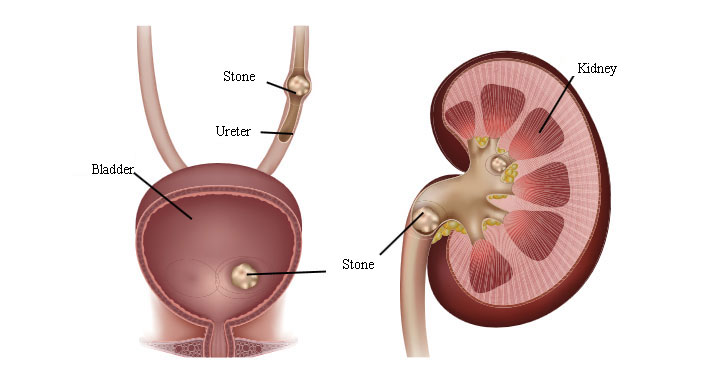Renal Colic:
- Renal colic refers to abdominal pain in animals originating from kidneys
- Renal colic occurs due to presence of uroliths or crystals within kidneys or urinary tract.

Etiology:
- It primarily occurs due to uroliths in kidneys or other parts of urinary tract
- Calcium oxalate crystals and struvite crystal are most common stones found in small animals.
- In large animals, beside these minerals, uroliths of calcium carbonate, silica stones are also found.
Clinical Findings:
- Animals with renal colic shows signs of extreme pain and discomfort.
- Restlessness
- Frequent urination attempt in animals
- Straining to urinate
- Crying or vocalizing while urinating, bloody urine
- Arching of back, hunching
- Reluctant to move
Diagnosis:
- Based on history of diet and water intake
- Physical examination of animals
- Based on clinical findings
- Based on laboratory findings; presence of uroliths on sediment examination during urinalysis
- Radiographic examination and ultrasonographic examination
Treatment:
- NASID drugs such as meloxicam, carpofen, firocoxib should be used to relieve pain
- In case of severe pain, opoids can be used. Morphine or codeine are drug of choice. Morphine @ 0.1-0.5mg/kg, b.wt., IV, IM or PO depending on situation.
- Fluid therapy should be given to relieve dehydration causing formation of stones.
- Dietary changes should be made based on composition of uroliths.
- Depending on pH of urine, urinary acidifier or alkalizer should be used to break down stones and maintain normal environment of urinary tract.
- Animals should have 24 hours’ access to clean and abundant drinking water.
- Muscle relaxants like methocarbamol may be used to alleviate muscle spasms and reduce pain.
- Antiemetic drugs, such as maropitant or ondansetron, may be given to alleviate these symptoms. Ondansetron @ 1 to 2 mg/kg, body weight, IM or PO
- In some cases, local anesthetics may be used to provide regional pain relief, such as an epidural block.